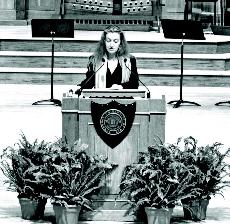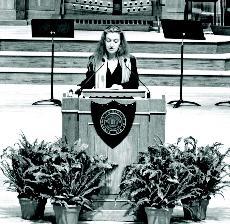
(Nhi Nguyen)
The fourth installment of the
2009-2010 convocation series at
Lawrence featured essayist, historian
and political journalist Rebecca
Solnit on Tuesday, April 20.
In her address, “Swimming
Upstream in History: Hope,
Disaster and Utopia,” Solnit spoke
about hope that sprouts from
disaster and barriers between
neighbors that can disolve when
there are urgent needs.
The Faculty Brass Ensemble
along with university organist
Kathrine Handford played pieces
by Bach and Charles Koechlin for
the prelude. For the interlude, the
selection was the third movement
of “Ritual Protocol” by Kevin Puts,
with Dane Richeson on marimba
and Michael Mizrahi on piano.
After an introduction by
Provost and Dean of the Faculty
David Burrows, Solnit addressed a
rather small audience, the majority
of whom congregated in the
balcony of the Chapel.
The speech opened with
words from American poet Muriel
Rukeyser. “The world is made
up of stories, not atoms,” read
Solnit. She talked about stories
from Native American tribes that
have taken over 514 years to tell
and about how important it is to
listen and to continue creating
these stories.
Solnit’s goal as a writer is to
“stick with certain subjects for a
long enough time that [she] will be
able to witness change” in stories.
Patience is key in this listening
endeavor. “Change is not an army,”
said Solnit. “It is a crab scuttling
sideways – drips of water wearing
away stones.”
Though change is slow, however,
its direction is not inevitable.
Solnit proved this idea with examples
of large-scale changes that
were started by a small number of
people, using Mahatma Gandhi as
a prime example.
Her political writing epitomizes
this belief that small acts can
make great impacts on the story
of history. Solnit’s political essays
can be found on TomDispatch.com
and in Harper’s Magazine, and
her 12 published books contain
memoirs and essays on geography,
the environment and spatial interactions.
Carolyn Armstrong and
Stephen Anunson, two Lawrence
seniors who are currently collecting
stories, music and images from
Haiti to create an independent feature-
length documentary through
Bel Son Productions, were able to
meet with Solnit for a private interview
during her visit.
Since a large portion of their
documentary is taking place
around Haiti’s musical culture,
Armstrong and Anunson asked
Solnit about what she conceived
the role of music to be in communities
that faced disaster.
“She, too, saw that music can
be a sort of social leveler, a way to
look past the social constructs we
place around ourselves and to help
us realize a common humanity,”
stated Anunson after the interview.
Aside from this interview,
Solnit also attended a luncheon
with a group of students in the
Kraemer Conference Room and
an hour-long question and answer
session in the Warch Campus
Center Cinema.
The fifth installment of the
Convocation Series will take place
Thursday, May 20 with Vermont
State Senator Robert Hartwell
’69, who will be giving a speech
titled “America at the Crossroads:
Accepting the Climate Change
Challenge.

(Nhi Nguyen)
